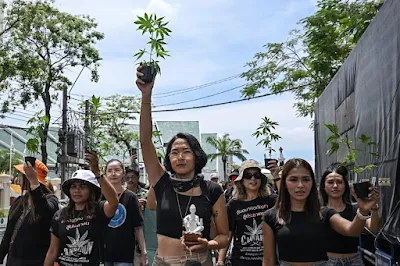BANGKOK, June 25 — Thailand’s cannabis industry, once hailed as a transformative economic opportunity, has been thrown into turmoil as the government initiates steps to recriminalise recreational use, potentially reversing a landmark policy shift just three years after the country became the first in Asia to decriminalise the drug.
The abrupt policy reversal follows the withdrawal of the Bhumjaithai Party from the ruling coalition, a political rupture triggered by Prime Minister Paetongtarn Shinawatra’s handling of a recent diplomatic row with Cambodia. Bhumjaithai, which had championed cannabis legalisation, had made regulation a cornerstone of its agenda.
Late Tuesday, Thailand’s Ministry of Public Health issued an order banning the recreational sale of cannabis and requiring all future purchases to be made strictly under medical prescription. The regulation is expected to come into force within days, once formally published in the Royal Gazette.
“Cannabis will be classified as a narcotic in the future,” Health Minister Somsak Thepsuthin announced, signalling a return to pre-2022 drug control frameworks.
A Booming Yet Unregulated Industry
Thailand’s cannabis sector experienced explosive growth after the substance was removed from the national narcotics list in 2022, despite the absence of comprehensive legislation to regulate its use. Dispensaries and related businesses proliferated across urban and tourist hotspots, with the Thai Chamber of Commerce projecting the industry’s value — including medicinal and ancillary products — could exceed $1.2 billion by 2025.
Today, more than tens of thousands of cannabis-related businesses operate across the country, many of which now face severe uncertainty over their futures.
The lack of oversight, officials say, has created unintended social consequences. Government spokesperson Jirayu Houngsub cited rising concerns over unregulated access, particularly among youth, and emphasized a return to cannabis's original intent as a controlled substance for medical use only.
Industry Reels from Sudden Policy Shift
For many entrepreneurs, the news has landed as a financial and existential shock.
“This is my main source of income,” said Punnathat Phutthisawong, 25, who works at the Green House Thailand dispensary in Bangkok. “Many shops are probably just as shocked because a lot of them invested heavily.”
Cannabis advocates have also decried the decision as a politically driven reversal that undermines both market confidence and public health potential.
“The cannabis industry has become a hostage to politics,” said long-time activist Chokwan ‘Kitty’ Chopaka, who argued that the plant had the potential to revolutionise Thai agriculture, medicine, and tourism — had the government pursued a consistent and regulated rollout.
Uncertainty on the Ground
Despite the announcement, business continues — for now. On Khao San Road, a popular Bangkok tourist destination, cannabis dispensaries remain open, still drawing customers curious about the impending changes.
Daniel Wolf, a visitor from Australia, expressed disbelief over the government's plan.
“There are shops everywhere, so how do they reverse this? I don’t think they can. It’s absolutely insane,” he said.
Industry players and observers alike are now awaiting clarity on implementation timelines and enforcement measures. In the absence of clear transitional policies or compensation frameworks, businesses face the grim possibility of asset write-downs and layoffs.
A Cautionary Tale
Thailand’s cannabis U-turn offers a cautionary tale of regulatory improvisation colliding with political instability. While the decriminalisation move in 2022 was globally lauded as progressive, the lack of formal legislation and political consensus has left the sector vulnerable to shifting priorities.
As recriminalisation looms, questions persist over how authorities will unwind a commercial ecosystem that, in just a few years, has taken deep root in Thailand’s economy and social landscape — and whether the government can contain the fallout of its policy reversal without undermining investor confidence and livelihoods.




.png)
The opinions posted here do not belong to 🔰www.indiansdaily.com. The author is solely responsible for the opinions.
As per the IT policy of the Central Government, insults against an individual, community, religion or country, defamatory and inflammatory remarks, obscene and vulgar language are punishable offenses. Legal action will be taken for such expressions of opinion.